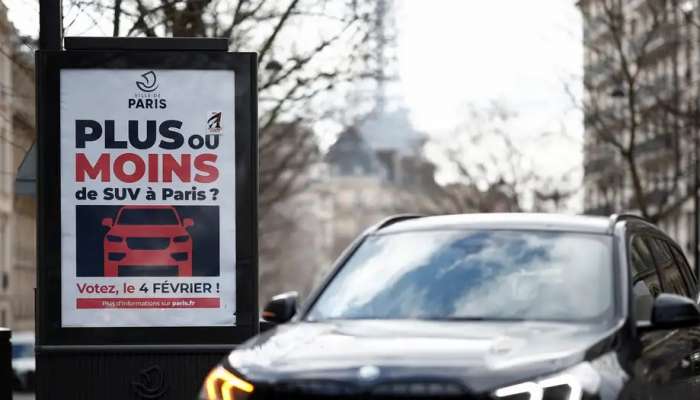
Paris: The stylised red car splashed against a black background certainly looks threatening. The question posed on posters lining the streets of the French capital ahead of a referendum on Sunday is rhetorical: "Do you want more SUVs on the streets of Paris or fewer?"
Mayor Anne Hidalgo is hoping the 1.3 million Parisians entitled to vote will opt for the latter choice. "The bigger, the more environmentally damaging" is how the center-left politician sums up her views on cars. It's around this stance, and others, that she has been radically remodelling Paris in recent years.
Hidalgo has said she wants to make the city more environmentally friendly and improve quality of life. She points to studies showing that more than half of the city's residents are breathing in poor-quality air.
To make Paris "greener," the mayor has already declared the banks of the Seine a pedestrian zone despite huge resistance, closed the main traffic artery road in the historic center, the Rue de Rivoli, to traffic and introduced a 30 kilometer per hour (about 18.5 miles per hour) speed limit throughout the city. She has also removed parking spaces and created new cycle paths. By 2026, Paris aims to be 100% bike friendly.
On the ballot on Sunday is not an outright ban, but a proposal to deter SUV drivers with high parking prices. Citizens will decide "for or against the introduction of a special tariff for parking heavy, bulky and environmentally unfriendly vehicles" known as SUVs, an acronym for sport utility vehicle.
If Hidalgo gets her way, parking fees for cars with combustion engines or plug-in hybrid drives and a weight of more than 1.6 tons (2 tons for electric vehicles) will triple in the central Paris districts to €18 ($19) per hour. For six hours downtown, the charge will be €225. In the outer districts, the first hour is only somewhat cheaper at €12.
The French car drivers' association 40 millions d'automobilistes is fighting the initiative. With an online petition entitled "Stop the fight against SUVs," the group is mobilizing against the project, which could have an impact far beyond the capital. Politicians in other major French cities such as Lyon, Bordeaux and Grenoble are already discussing higher parking fees for large cars.
As in other EU countries, SUVs are a particularly popular vehicle in France. According to the association, this type of vehicle accounted for almost half of new registrations in the first half of 2023. Moreover, the organization believes the fight against SUVs is only the beginning. "It's about eradicating the car altogether," it said.
Residents of the French capital may be more sanguine about the referendum, as there are a number of exemptions planned for the proposed rule. Parisian residents and stationary tradespeople who park in their parking permit zones, cab drivers at special cab ranks, tradespeople and health care professionals will not be affected.
To drive home their point on the campaign trail, French environmental associations as well as Hidalgo are pointing to the high emissions released by these heavy vehicles. They've also highlighted road safety issues, as well as questions about the use of public space.
According to city authorities, SUVs are twice as deadly to pedestrians as normal cars. "The vote is aiming to send a message to car manufacturers and their greed for profit. The fact that they are deliberately selling ever larger, more fuel-intensive and expensive vehicles is jeopardizing the green transition," city authorities have argued.
Since taking office, Hidalgo has made bold environmental policy a key part of her political brand. "We currently find ourselves in the middle of a process of change. And the most difficult thing about this phase is that we must change our habits," Hidalgo said in a television interview a few years back.
On the local level, the strategy has paid off for the politician, who belongs to the center-left Socialist Party. While Hidalgo garnered under 2% of the vote nationwide in her ill-fated presidential candidacy bid two years ago, she fared well in municipal elections in early 2020. Her red and green coalition saw off her rivals with ease.
If Hidalgo succeeds with the introduction of the higher parking fees, car drivers may have to prepare for further restrictions. From the start of 2025, Paris is planning to impose a ban on diesel cars produced before 2011. This example, however, also shows the difficulty of imposing bans. The new rule was supposed to kick in at the start of this month, but Hidalgo wasn't able to push it through.
After the Paris Summer Olympics, which are set to start late July, the speed limit on the busy city ring road, the Perepherique, is to be reduced from the current 70 kilometres per hour to 50 kilometres per hour (about 30 miles/hour). Whatever the outcome of the SUV vote on Sunday, drivers in Paris will soon have less and less room to maneuver.